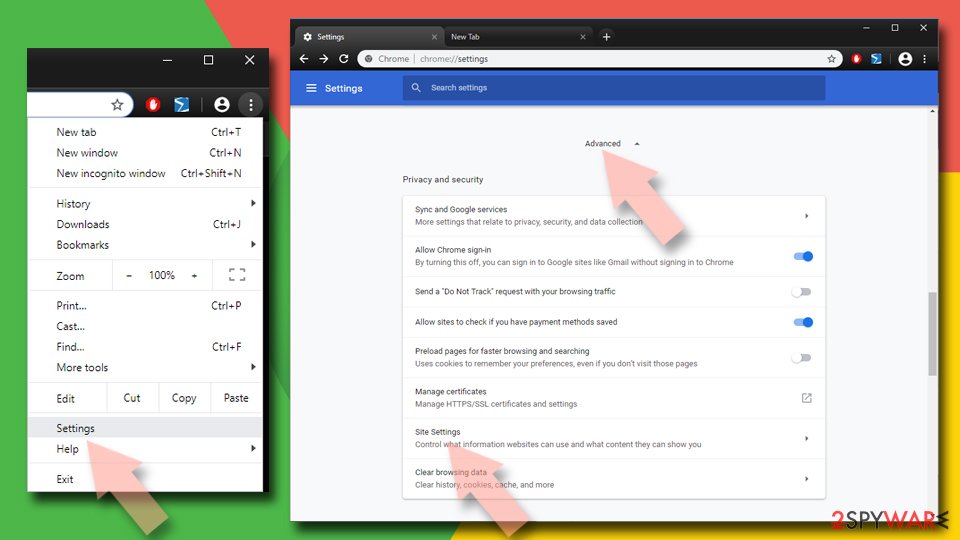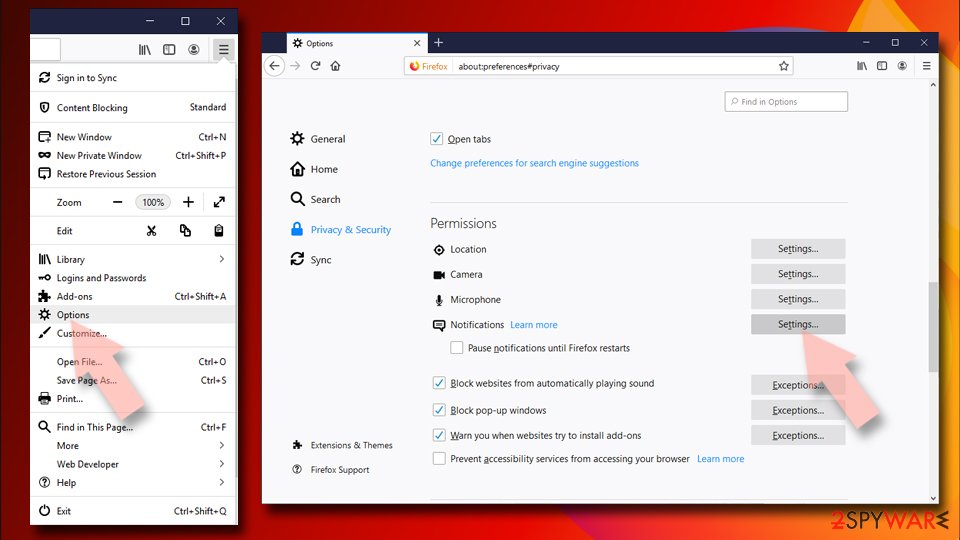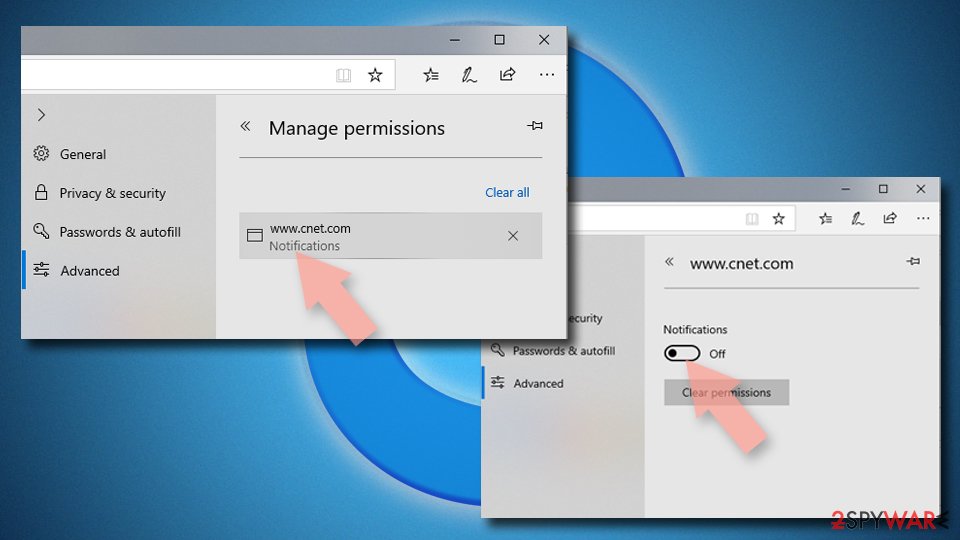News-naroro.cc ads (spam) - Free Guide
News-naroro.cc ads Removal Guide
What is News-naroro.cc ads?
News-naroro.cc gets people to subscribe to push notifications and then spams them with ads

News-naroro.cc is a dubious website that tricks people into clicking the “Allow” button using social engineering techniques. It makes people think they need to confirm that they are not robots before they can proceed. What the page actually does is gain permission to show push notifications.
People start getting spammed with annoying pop-up ads that can appear even when the browser is closed. The ads are not just annoying, they are dangerous. Links embedded in them can lead users to shady websites that want to lure out personal information or fool users into downloading PUPs (potentially unwanted programs)[1] and malware.
As a result, users may be taken to scam sites, like fake software updates, virus warnings, giveaways, and surveys. If people provide their information to the wrong individuals they can suffer from monetary losses or even identity theft. The pop-ups could also be promoting adult sites so it is important to stop these notifications especially if children are using the affected device.
| NAME | News-naroro.cc |
| TYPE | Push notification spam; adware |
| SYMPTOMS | Pop-up ads start appearing in the corner of the screen sometimes even when the browser is closed |
| DISTRIBUTION | Shady websites, deceptive ads, freeware installations |
| DANGERS | Links embedded in the pop-ups can lead to dangerous websites where people can get tricked into providing their personal information or downloading PUPs and malware |
| ELIMINATION | Disable push notifications via browser settings |
| FURTHER STEPS | Use FortectIntego to fix any remaining damage and clean your browsers |
When people stumble upon this website, they are met with a non-threatening picture of a man and a robot waving at each other. Next to them, there is a blue circle that says:
Type allow to verify that you are not robot.
The funny thing is, that there is no box to write in. What the website actually wants you to do is press the “Allow” button on a browser prompt at the top left corner of the screen. The pop-up clearly says that News-naroro.cc wants to show push notifications and users have the options to allow or block them.
People often rush while surfing the web and do not read everything fully. That is when such issues as pop-ups appear. Usually, they do not show up right away. When some time passes, the pop-ups appear seemingly out of nowhere, that is why many people think that they have been infected with a virus.

Start the removal process
1. Disable push notifications
Push notifications are based on a subscription model, so you can only start receiving them only if you agree to. That is why only manual removal is possible – you need to disable the notifications via browser settings:
Google Chrome (desktop):
- Open Google Chrome browser and go to Menu > Settings.
- Scroll down and click on Advanced.
- Locate the Privacy and security section and pick Site Settings > Notifications.
![Stop notifications on Chrome PC 1 Stop notifications on Chrome PC 1]()
- Look at the Allow section and look for a suspicious URL.
- Click the three vertical dots next to it and pick Block. This should remove unwanted notifications from Google Chrome.
![Stop notifications on Chrome PC 2 Stop notifications on Chrome PC 2]()
Google Chrome (Android):
- Open Google Chrome and tap on Settings (three vertical dots).
- Select Notifications.
- Scroll down to Sites section.
- Locate the unwanted URL and toggle the button to the left (Off setting).
![Stop notifications on Chrome Android Stop notifications on Chrome Android]()
Mozilla Firefox:
- Open Mozilla Firefox and go to Menu > Options.
- Click on Privacy & Security section.
- Under Permissions, you should be able to see Notifications. Click Settings button next to it.
![Stop notifications on Mozilla Firefox 1 Stop notifications on Mozilla Firefox 1]()
- In the Settings – Notification Permissions window, click on the drop-down menu by the URL in question.
- Select Block and then click on Save Changes. This should remove unwanted notifications from Mozilla Firefox.
![Stop notifications on Mozilla Firefox 2 Stop notifications on Mozilla Firefox 2]()
Safari:
- Click on Safari > Preferences…
- Go to Websites tab and, under General, select Notifications.
- Select the web address in question, click the drop-down menu and select Deny.
![Stop notifications on Safari Stop notifications on Safari]()
MS Edge:
- Open Microsoft Edge, and click the Settings and more button (three horizontal dots) at the top-right of the window.
- Select Settings and then go to Advanced.
- Under Website permissions, pick Manage permissions and select the URL in question.
- Toggle the switch to the left to turn notifications off on Microsoft Edge.
![Stop notifications on Edge 2 Stop notifications on Edge 2]()
MS Edge (Chromium):
- Open Microsoft Edge, and go to Settings.
- Select Site permissions.
- Go to Notifications on the right.
- Under Allow, you will find the unwanted entry.
- Click on More actions and select Block.
![Stop notifications on Edge Chromium Stop notifications on Edge Chromium]()
Internet Explorer:
- Open Internet Explorer, and click on the Gear icon at the top-right on the window.
- Select Internet options and go to Privacy tab.
- In the Pop-up Blocker section, click on Settings.
- Locate web address in question under Allowed sites and pick Remove.
![Stop notifications on Internet Explorer Stop notifications on Internet Explorer]()
2. Clear your browsers
After you have disabled the pop-ups there is another worrying thing that you should take care of. Almost every website you visit uses cookies[2] to gather information about your activities. Considering that you were infected with push notifications from a shady site, we assume that your data could be held in untrustworthy individual hands. The good thing is that you can delete cookies because they are stored on your device.
These small data files can be sold to advertising networks or other third parties and used to target you with ads even more. There have been cases when cookies were even hijacked and used for malicious purposes. FortectIntego is perfect for taking care of this issue as it will take care of all your browsers automatically so you do not have to worry about it. Besides that, this tool can fix registry issues, BSoDs, and other system errors that can occur after serious infections.
3. Scan the system with anti-malware tools
In some instances, users get redirected to pages like this by their browser itself and not because they clicked on a random link. That is a sign of an adware[3] infection. The most common way it is distributed is by freeware distribution sites. They include additional programs in the installers that users do not notice.
It would be best if you just used professional security software to scan your machine because PUAs like this are often disguised as handy tools. Because there is no way of knowing which specific app is causing this annoying behavior, manual removal can be difficult. We always suggest our readers use anti-malware tools like SpyHunter 5Combo Cleaner or Malwarebytes to scan their PCs.
Adware performs tasks in the background without the users' knowledge. These tools can detect suspicious processes that are active in the background and eliminate them completely with all the related files. If you want to proceed with a manual removal you can follow the instructions below for Windows and Mac machines:
Windows 10/8:
- Enter Control Panel into Windows search box and hit Enter or click on the search result.
- Under Programs, select Uninstall a program.
![Uninstall from Windows 1 Uninstall from Windows 1]()
- From the list, find the entry of the suspicious program.
- Right-click on the application and select Uninstall.
- If User Account Control shows up, click Yes.
- Wait till uninstallation process is complete and click OK.
![Uninstall from Windows 2 Uninstall from Windows 2]()
Windows 7/XP:
- Click on Windows Start > Control Panel located on the right pane (if you are Windows XP user, click on Add/Remove Programs).
- In Control Panel, select Programs > Uninstall a program.
![Uninstall from Windows 7/XP Uninstall from Windows 7/XP]()
- Pick the unwanted application by clicking on it once.
- At the top, click Uninstall/Change.
- In the confirmation prompt, pick Yes.
- Click OK once the removal process is finished.
Mac:
- From the menu bar, select Go > Applications.
- In the Applications folder, look for all related entries.
- Click on the app and drag it to Trash (or right-click and pick Move to Trash)
![Uninstall from Mac 1 Uninstall from Mac 1]()
To fully remove an unwanted app, you need to access Application Support, LaunchAgents, and LaunchDaemons folders and delete relevant files:
- Select Go > Go to Folder.
- Enter /Library/Application Support and click Go or press Enter.
- In the Application Support folder, look for any dubious entries and then delete them.
- Now enter /Library/LaunchAgents and /Library/LaunchDaemons folders the same way and terminate all the related .plist files.
![Uninstall from Mac 2 Uninstall from Mac 2]()
If you want to avoid adware infections in the future, it is best to use official developer websites or web stores to download software. Even though it might get costly, it is the safest way to get programs and you might save in the long run. Viruses, malware can cause serious system damage and peer-to-peer file-sharing platforms are full of them.
Another thing you can do is always choose the “Custom” or “Advanced ” installation method, read the Terms of Use, and Privacy Policy to find out what data will be collected by the program. The most important part is to check the file list and untick the boxes next to any additional apps.
How to prevent from getting adware
Access your website securely from any location
When you work on the domain, site, blog, or different project that requires constant management, content creation, or coding, you may need to connect to the server and content management service more often. The best solution for creating a tighter network could be a dedicated/fixed IP address.
If you make your IP address static and set to your device, you can connect to the CMS from any location and do not create any additional issues for the server or network manager that needs to monitor connections and activities. VPN software providers like Private Internet Access can help you with such settings and offer the option to control the online reputation and manage projects easily from any part of the world.
Recover files after data-affecting malware attacks
While much of the data can be accidentally deleted due to various reasons, malware is one of the main culprits that can cause loss of pictures, documents, videos, and other important files. More serious malware infections lead to significant data loss when your documents, system files, and images get encrypted. In particular, ransomware is is a type of malware that focuses on such functions, so your files become useless without an ability to access them.
Even though there is little to no possibility to recover after file-locking threats, some applications have features for data recovery in the system. In some cases, Data Recovery Pro can also help to recover at least some portion of your data after data-locking virus infection or general cyber infection.
- ^ PUP (potentially unwanted program). SearchSecurity. TechTarget. Malware.
- ^ What is Adware? – Definition and Explanation. Kaspersky. Home Security.
- ^ Chris Maus. What Are Cookies and Are They Dangerous?. Qkey. Secure Payments.














